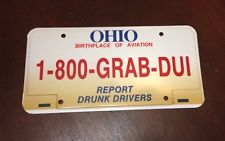 The special license plates for DUI offenders are commonly referred to as “party plates” and “family plates”. The official term in Ohio is “restricted license plates”. Whatever you call them, nobody wants them. In Ohio, the plates are yellow with red lettering, and they signal to everybody the driver of that vehicle was convicted of DUI (called ‘OVI’ in Ohio). This article explains when the plates are required, how they are obtained, and possible penalties for restricted plate violations.
The special license plates for DUI offenders are commonly referred to as “party plates” and “family plates”. The official term in Ohio is “restricted license plates”. Whatever you call them, nobody wants them. In Ohio, the plates are yellow with red lettering, and they signal to everybody the driver of that vehicle was convicted of DUI (called ‘OVI’ in Ohio). This article explains when the plates are required, how they are obtained, and possible penalties for restricted plate violations.
Articles Tagged with DUI
Coming to Ohio: Oral Fluid Tests for DUI/OVI

According to a news report by NBC4 Columbus, the state of Ohio intends to use oral fluid testing to obtain evidence of drugged driving. In the video from NBC4, the Ohio Traffic Safety Council indicates there are increasing numbers of crashes caused by drug-impaired drivers. To combat this problem, the Traffic Safety Council recommends that law enforcement agencies implement oral fluid testing. This testing method has some advantages over currently used drug tests, but it also has drawbacks.
Ohio Supreme Court Settles Speedy Trial Issue in DUI/OVI Cases
 In DUI cases (called ‘OVI’ in Ohio), a defendant is sometimes charged with two OVI charges. One charge is OVI ‘impaired’, based on operating a vehicle under the influence of alcohol and/or drugs. The other charge is OVI ‘per se’, based on operating a vehicle with a prohibited concentration of alcohol and/or drugs in the driver’s breath, blood, or urine. In cases involving blood and urine tests, the charge of OVI ‘per se’ is often filed weeks or months after the charge of OVI ‘impaired’ is filed, as law enforcement waits to file the ‘per se’ charge until after receiving the results of the blood/urine test.
In DUI cases (called ‘OVI’ in Ohio), a defendant is sometimes charged with two OVI charges. One charge is OVI ‘impaired’, based on operating a vehicle under the influence of alcohol and/or drugs. The other charge is OVI ‘per se’, based on operating a vehicle with a prohibited concentration of alcohol and/or drugs in the driver’s breath, blood, or urine. In cases involving blood and urine tests, the charge of OVI ‘per se’ is often filed weeks or months after the charge of OVI ‘impaired’ is filed, as law enforcement waits to file the ‘per se’ charge until after receiving the results of the blood/urine test.
In those cases, when does the speedy trial clock start for the later-filed charge of OVI ‘per se’? Is it when the original charge was filed, when the test results were received, or when the second charge is filed? That question was recently answered by the Ohio Supreme Court.
Vegas DUI Seminar: Practice Like a Pro
 I’m not crazy about cold weather, and autumn signals the inevitable temperature decreases in Ohio. On the other hand, autumn also means the O.S.U. football season, as well as the annual DUI defense seminar in Las Vegas. I have attended the seminar about 20 times, and this year I gave a presentation.
I’m not crazy about cold weather, and autumn signals the inevitable temperature decreases in Ohio. On the other hand, autumn also means the O.S.U. football season, as well as the annual DUI defense seminar in Las Vegas. I have attended the seminar about 20 times, and this year I gave a presentation.
Ohio Supreme Court: Forfeiture of $31,000 Vehicle for DUI/OVI Not Excessive
 Back in 1791, when the 8th Constitutional Amendment was ratified, the Framers of the Constitution decided there should be limits on financial sanctions for criminal behavior. Accordingly, the 8th Amendment prohibits ‘excessive fines’. Courts have interpreted the Constitutional prohibition of excessive fines to apply to forfeiture of property in criminal cases. The Ohio Supreme Court recently held that forfeiture of a $31,000 vehicle for a repeat DUI conviction (called ‘OVI’ in Ohio) does not violate the Excessive Fines Clause of the 8th Amendment.
Back in 1791, when the 8th Constitutional Amendment was ratified, the Framers of the Constitution decided there should be limits on financial sanctions for criminal behavior. Accordingly, the 8th Amendment prohibits ‘excessive fines’. Courts have interpreted the Constitutional prohibition of excessive fines to apply to forfeiture of property in criminal cases. The Ohio Supreme Court recently held that forfeiture of a $31,000 vehicle for a repeat DUI conviction (called ‘OVI’ in Ohio) does not violate the Excessive Fines Clause of the 8th Amendment.
Ignition Interlock Devices for Ohio DUI / OVI
 From the 2008 Lindsay Lohan stories to the 2022 news reports about Paul Pelosi’s DUI conviction, the past 14 years have shown a dramatic increase in the use of ignition interlock devices (IIDs) for individuals charged with DUI (called ‘OVI’ in Ohio). A recent report by Coherent Market Insights indicates IIDs in North America will be a $68.5 million industry by 2027. In Ohio, the increased use of IIDs is due, in part, to Annie’s Law. IIDs may be an effective method of preventing OVI, but they do have drawbacks.
From the 2008 Lindsay Lohan stories to the 2022 news reports about Paul Pelosi’s DUI conviction, the past 14 years have shown a dramatic increase in the use of ignition interlock devices (IIDs) for individuals charged with DUI (called ‘OVI’ in Ohio). A recent report by Coherent Market Insights indicates IIDs in North America will be a $68.5 million industry by 2027. In Ohio, the increased use of IIDs is due, in part, to Annie’s Law. IIDs may be an effective method of preventing OVI, but they do have drawbacks.
Effects of Prior Test Refusals and Convictions on Ohio DUI/OVI Sentences
 Suppose a person is charged with DUI (called ‘OVI’ in Ohio) and that person previously refused an alcohol/drug test when arrested for OVI. Can that person’s sentence be enhanced for the current OVI based on the prior refusal? This question was recently addressed by the Wisconsin Supreme Court. In Ohio, this question is addressed in the Ohio OVI statutes. The Ohio OVI statutes are nuanced and do provide consequences for prior convictions and test refusals.
Suppose a person is charged with DUI (called ‘OVI’ in Ohio) and that person previously refused an alcohol/drug test when arrested for OVI. Can that person’s sentence be enhanced for the current OVI based on the prior refusal? This question was recently addressed by the Wisconsin Supreme Court. In Ohio, this question is addressed in the Ohio OVI statutes. The Ohio OVI statutes are nuanced and do provide consequences for prior convictions and test refusals.
Driver Intervention Programs for Ohio DUI / OVI
 Most people charged with a first-offense DUI (called ‘OVI’ in Ohio) are not aware of the possible consequences. When someone in that situation learns the sentence for a first OVI conviction in Ohio includes a mandatory minimum jail term of three days, it can be frightening. However, judges are authorized to substitute a three-day driver intervention program (DIP) in place of three days in jail. This article provides details about DIPs in OH.
Most people charged with a first-offense DUI (called ‘OVI’ in Ohio) are not aware of the possible consequences. When someone in that situation learns the sentence for a first OVI conviction in Ohio includes a mandatory minimum jail term of three days, it can be frightening. However, judges are authorized to substitute a three-day driver intervention program (DIP) in place of three days in jail. This article provides details about DIPs in OH.
Blood Test Clears Sober Parent of DUI and Child Endangering
 Imagine you are totally sober, but your child’s daycare calls the police and reports you may be intoxicated. Imagine further the police make you perform field sobriety tests while your toddler is running around on the sidewalk. Now imagine you are prosecuted for DUI (called ‘OVI’ in Ohio) and Child Endangering and your child is taken away from you for two months, only for a blood test to show no alcohol or drugs, because you were totally sober. Katie Slayton does not have to imagine it: it happened to her. Her experience was the perfect storm of circumstances in a DUI/OVI investigation.
Imagine you are totally sober, but your child’s daycare calls the police and reports you may be intoxicated. Imagine further the police make you perform field sobriety tests while your toddler is running around on the sidewalk. Now imagine you are prosecuted for DUI (called ‘OVI’ in Ohio) and Child Endangering and your child is taken away from you for two months, only for a blood test to show no alcohol or drugs, because you were totally sober. Katie Slayton does not have to imagine it: it happened to her. Her experience was the perfect storm of circumstances in a DUI/OVI investigation.
Pedal Pubs and DUI/OVI on Non-Motorized Vehicles in Ohio
 Can you get a DUI (called ‘OVI’ in Ohio) on a vehicle which is not motorized? Like many legal questions, the answer is, ‘maybe’. A person involved in a recent ‘pedal pub’ incident found out the hard way the answer is ‘yes’ when operating a mobile bar in Georgia. But what about Ohio?
Can you get a DUI (called ‘OVI’ in Ohio) on a vehicle which is not motorized? Like many legal questions, the answer is, ‘maybe’. A person involved in a recent ‘pedal pub’ incident found out the hard way the answer is ‘yes’ when operating a mobile bar in Georgia. But what about Ohio?
 Columbus OVI/DUI Attorney Blog
Columbus OVI/DUI Attorney Blog

